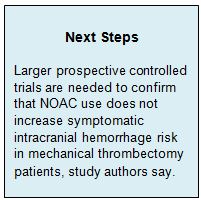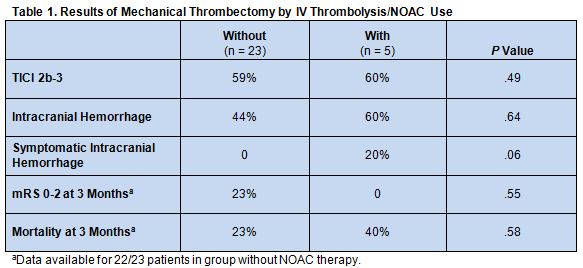Key Points:
- Study assesses outcomes of mechanical thrombectomy with, without use of NOACs
- No increased risk of intracranial hemorrhage with use of the newer drugs
Mechanical thrombectomy for the treatment of acute ischemic stroke can safely be performed in patients taking novel oral anticoagulants (NOACs), according to a Brief Report published online March 1, 2016, ahead of print in Stroke.
Roland Veltkamp, MD, of Imperial College London (London, England), and colleagues prospectively conducted a multicenter, observational study of patients enrolled in the Registry of Acute Ischemic Stroke Under New Oral Anticoagulants. All patients were undergoing thrombectomy with or without use of preceding IV thrombolysis and NOAC therapy for the treatment of ischemic stroke.
Among 28 patients who underwent thrombectomy, 5 (18%) also received systemic thrombolysis. While intracranial hemorrhage occurred in nearly half of patients overall, symptomatic intracranial hemorrhage was seen in only 1 patient (in the NOAC group).
Rates of successful reperfusion, defined as a modified Thrombolysis in Cerebral Infarction (TICI) score 2b-3, was equally likely in both groups. Other outcome measures, including 3-month mortality and modified Rankin Score (mRS) were similar regardless of whether patients did or did not receive a NOAC prior to mechanical thrombectomy (table 1).
Until now, write the authors, data on the safety of mechanical thrombectomy among patients taking NOACs has been limited, as previous trials either excluded use of oral anticoagulation or included very few patients.
The study is small, lacks a placebo group, and clearly requires replication in larger prospective controlled trials, the researchers acknowledge. But the findings are reassuring in that they do suggest that the use of NOACs during thrombectomy is not associated with an increased risk of symptomatic intracranial hemorrhage and thus is “reasonably safe,” they say. However, “a comparatively high rate of asymptomatic hemorrhagic transformation was noted.”
Source:
- Purrucker JC, Wolf M, Haas K, et al. Safety of Endovascular Thrombectomy in Patients Receiving Non-Vitamin K Antagonist Oral Anticoagulants. Stroke. 2016;Epub ahead of print.
Disclosures:
- Dr. Veltkamp reports receiving personal fees, speakers, consulting honoraria, and research support from Pfizer, BMS, Boehringer Ingelheim, Bayer, Daiichi Sankyo, and CSL Behring.



